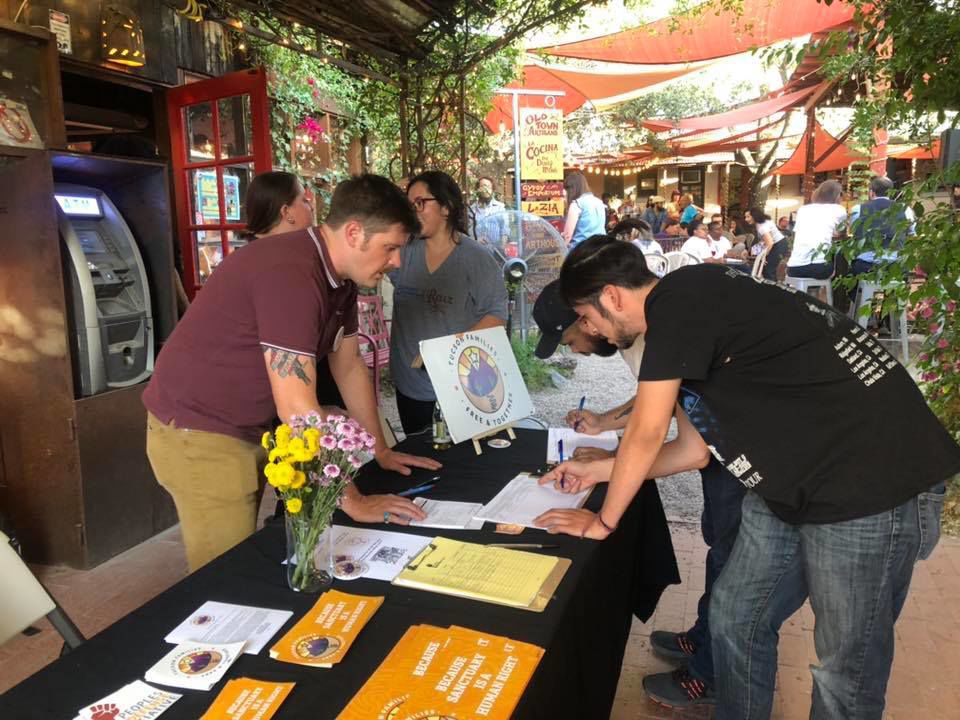A few sentences deep in the four-page “sanctuary city” initiative has the Tucson City Council concerned police here will lose access to a number of federal databases and will be unable to collaborate with federal agencies.
Organizers of the citizen-led ballot measure, the People’s Defense Initiative, say that concern is unfounded. The provision, the say, simply limits the police from collaborating with federal agencies for the purpose of enforcing immigration law during traffic stops. It does not, they argue, prohibit collaboration in other circumstances.
Proposition 205, The Tucson Families Free and Together initiative, would limit circumstances in which Tucson police officers can ask about immigration status. It also requires a formal agreement between the city and various federal agencies, also known as a memorandum of understanding.
The latter is a sticking point with the opponents of Prop. 205. They say the Trump administration is going to reject any agreement that limits the ability of federal agencies to inquire about a person’s immigration status.
The first criticism of Prop. 205 from city officials was a eight-page memo from City Attorney Mike Rankin to the City Council.
While Rankin said the memo was a simple analysis of the initiative for the benefit of the City Council, the People’s Defense Initiative is suing the city arguing that the memo — and other communications — are part of a city effort to influence the outcome of the election.
In the memo, Rankin focuses heavily on a specific passage of the initiative that prohibits TPD and its officers from any joint law enforcement operations “or similar endeavor” with a federal agency without an existing, revised memorandum of understanding.
“As a practical matter, it is extremely unlikely that any of these federal agencies would consent to such an agreement. As a result, the effect of this provision would be that TPD could not collaborate with any of these federal law enforcement agencies in any joint law enforcement operation “or similar endeavor,” regardless of the nature of that operation,” Rankin wrote. “Examples include joint and collaborative law enforcement relating to illegal drug and firearms trafficking. This section would end those joint operations.”
Months later, another memo expanded on activities that could be affected by passage of Prop. 205. They include:
- Crime Lab positions and equipment
- Spanish-speaking detectives for sexual assault and domestic violence investigations
- Cold-case investigations involving previously untested sexual assault kits
- Traffic safety enforcement
- Records Management System needed for case reports, public records requests and data collection
- Narcotics and auto-theft investigations
The department said it could also restrict access to a number of federal databases, including the National Incident-Based Reporting System, which tracks child pornography and sexual exploitation cases; the National Integrated Ballistics Information Network; the National Data Exchange, which allows criminal justice agencies to search records submitted by local, federal and tribal agencies; and the Integrated Automated Fingerprint Identification System.
Attorney Billy Peard, one of the authors of the sanctuary city proposal, says the provision is limited to working with ICE and Border Patrol in matters related to immigration enforcement. It does not, he says, prevent other types of law enforcement activities with other agencies. For example, the ordinance would restrict the ability of ICE and Border Patrol to conduct routine traffic stops inside the city limits.
The initiative is written to ensure protections against racial profiling, Peard says. However, if someone is charged with a crime by Tucson police, their immigration status is checked at the jail.
Peard says the initiative was written so it does not violate existing state or federal laws. And Peard says he is confident that the handful of federal agencies affected by Prop. 205 will sign updated agreements with the city.
In many places, the initiative simply codifies the Police Department’s existing general orders so that they can’t be undone if there is a change in leadership at the City Council level, Peard said.
Only voters could remove those protections in another election.
Peard concedes that there will be legal challenges if Prop. 205 passes.
And while he is confident the measure will prevail in court, Peard says that if courts rule that sections of Prop. 205 are not legal — those portions can be severed from the rest of the initiative. He notes there are plenty of “dead letter” laws still on the books that are simply ignored.
Any legal complications would be difficult to undo as it is part of the city charter, Rankin said in one of his memos.
“Because the measure is an initiative, the mayor and council would be powerless to amend or repeal its provisions without submitting a new measure to the electors for approval,” Rankin wrote.





